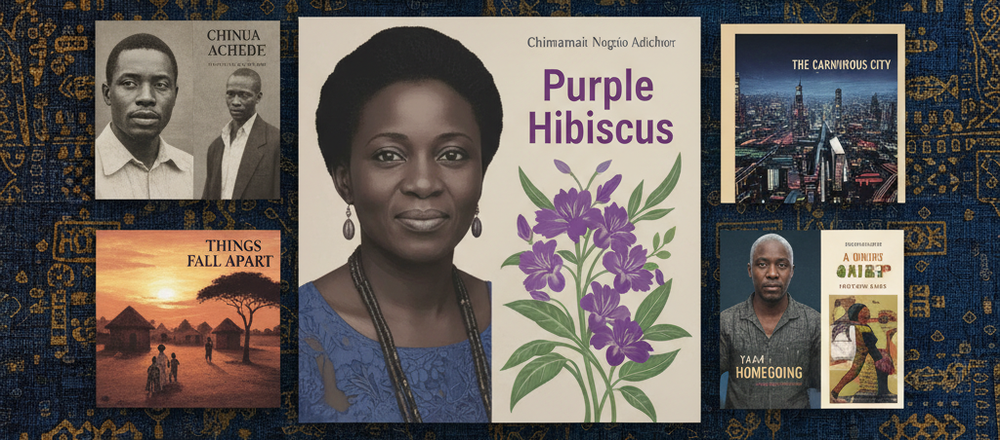Celebrating African Voices in Literature

11th October 2025
As part of Literacy Week and our commitment to celebrating diverse voices, we want to shine a spotlight on African authors who have transformed the literary world. African literature is rich with stories of identity, culture, history, and resilience. From Chinua Achebe to Ngũgĩ wa Thiong’o, Wole Soyinka to Chimamanda Ngozi Adichie, these writers remind us that stories are powerful — they shape how we see ourselves and how others see us.
This week, one of our club members, Kavan, has written about Chimamanda Ngozi Adichie, one of Africa’s most influential contemporary writers.
Chimamanda Ngozi Adichie by Kavan Kislayah Year 10B
Chimamanda Ngozi Adichie is a Nigerian writer of novels, short stories and even poems.
She was born in Enugu, Nigeria in 1977 to an Igbo family and grew up in Nsukka where her father was a professor at the University of Nigeria. She was studying medicine and pharmacy at the University of Nigeria, before leaving for the USA. She mentions in one of her TED talks, that when she was young, the books she read only had protagonists who were white, had blonde hair and would drink beer. Therefore, she would also write stories where her main characters were white and drank beer, then forced her mother to read them. However, when she got her hands on books written by the likes of Chinua Achebe and Camara Laye, she realised that even people like her could exist in literature, which removed her mind from having ‘the danger of a single story’.
When she went to the US to study, her roommate was shocked by the way she could speak English so fluently. She also assumed other things, such as Chimamanda not being able to use a stove, or listening to only tribal music. Chimamanda understood that the girl had felt sorry for her before even truly knowing her. She thought that Africans were in no way, shape or form similar to her in any way, and Chimamanda recognized she had only a single story of Africans. It was this experience that made her start planning her first novel and another story later called Americanah.
Her first book, Purple Hibiscus, was published in 2003. It won the Commonwealth Writer’s prize for best book, and many praised it as a reboot of Chinua Achebe’s Things Fall Apart and Arrow of God. She then went on to produce several other masterpieces, such as Americanah and Half of a Yellow Sun. All books explore a part of Nigerian life. For example, Purple Hibiscus highlights the effect of colonialism in Nigeria and how the country has radically changed, the truth is now considered controversial. Americanah is about the life of a Nigerian in the US, and what her skin, hair and background mean in a place like that.
She currently teaches writing at the University of Lagos and has recently published Dream Count, which follows the story of four African women whose lives intersect in the strangest ways and in the most strangest places.
Her story is definitely not over yet, and more of her tale is yet to follow.
Why this matters:
Including writers like Adichie in our conversations shows us that literature is not one-sided. Stories don’t just belong to one group, one country, or one culture — they belong to all of us. Reading African authors helps us celebrate identity, challenge stereotypes, and embrace the richness of diverse voices.
Watch out for more author spotlights and book recommendations in our upcoming newsletters. And don’t forget, our first fun library event is coming soon!




